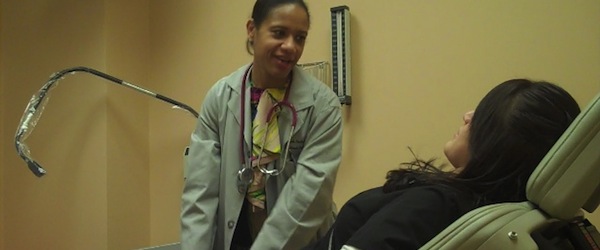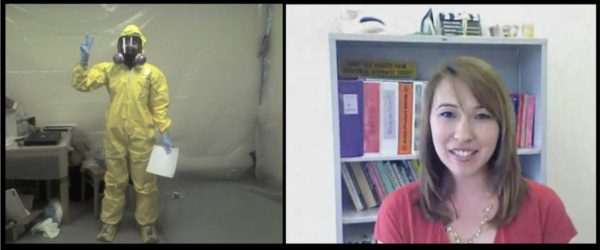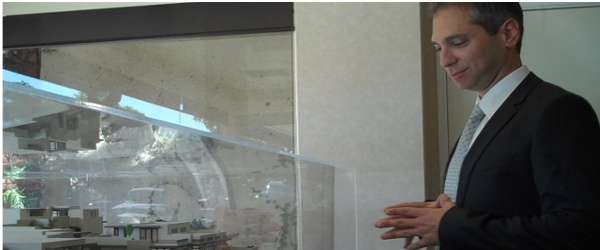Networking is an essential element to finding a job and building your career. In fact, it’s one of the 15 career development topics that will follow you through life. Today’s guest tells us that you’ll find the most success with networking if you build your network before you need it. Our guest is Scott Tsuchiyama, a career advisor and the Community Manager at the University of Michigan’s Career Center.
SNEAK PEEK (Full Episode + Transcript below)
|
RELATED VIDEOS |
Today’s Guest
 Scott Tsuchiyama: Scott’s LinkedIn page
Scott Tsuchiyama: Scott’s LinkedIn page
Grad School: U of Michigan (earning MSI in Human-Computer Interaction)
College Major: Sports Management
College: University of Michigan in Ann Arbor, MI
High School: Lakeview High School in Battle Creek, MI
First Job Ever: Groundskeeper at a local swimming pool
Worst Job Ever: See First Job Ever!
Networking In College
From using social networking tools online for building a community of people with common interests and goals to learning how to maximize business networking calls to taking advantage of informational interviewing, there are many ways to go about networking and building your network. In our interview, Scott explains the many aspects of networking that he discusses with Michigan’s students, including how to build your network before you need it.
I highly recommend you check out my favorite book on networking: Never Eat Alone: And Other Secrets to Success, One Relationship at a Time. I find this book by Keith Ferrazzi to be a great resource for anyone looking to get more comfortable with networking. In fact, I bought it for many of the attorneys I represented as a recruiter. You can buy it via the affiliate link above. Also check out our Career Resources.
FULL EPISODE
For our Audio Podcast: Careers Out There on iTunes
TRANSCRIPT OF TODAY’S INTERVIEW
Our guest is Scott Tsuchiyama. He works at the University of Michigan in their career center where he’s a community manager and he’s also a career advisor to students. He talks about networking all the time, so he’s got a lot to say. This is an important show so stick around!
[theme song] OK we’re back. Scott, welcome to Careers Out There.
University of Michigan Career Center’s Scott Tsuchiyama: Hi Marc. Thanks for having me!
Luber: Great. So fill us in. You work with students all the time and you’re talking to them about networking. So what is it that you tell them?
Scott Tsuchiyama: So usually it’s a lead-in off of a question like, “I’ve been applying for jobs, I’m not sure if my resume is terrible” or “I’ve been applying and I’ve sent in 50 resumes…50 applications online….and I’m not having any luck.”
So usually what it is is kind of leading in from that, saying that networking is the way you find jobs. It’s about building relationships with people, building up a community of people that share your professional interests….and that’s really the way that you’re going to be able to start finding the kind of jobs that you’re a good fit for – which is something that I know you’re really interested in in particular – and finding the type of jobs that you really want.
Luber: So what’s a typical question if a student is meeting with you and you’re doing some career advising. What’s a question that they’ll ask you about networking? What do they want to know and do they understand what it is?
Scott Tsuchiyama: I think a lot of students do it and they may inherently understand it but they don’t realize that they understand it. A lot of the things – there’s a lot of negative connotations around networking and so one of the things that I try to do pretty often is to try and break down some of those barriers and really help students realize that this is not shmoozy.
It’s really finding people that share your same interests, share your same goals and it’s a mutually beneficial sort of relationship. So if you’re out there looking for a job, a lot of times people think, “well this is gonna be really awkward because I’m gonna go up to them and just ask them for a job? How does that work?” They’re really turned off by that.
And usually what I tell them is that if they’re out there – they’ve got a posting up – their goal is the same as yours! They want to find someone that really fits the bill. And if you’re that person, then it shouldn’t be that awkward.
But even taking a step back and saying it’s really important to start doing this stuff early. That’s what I tell students a lot. We don’t always have that luxury if someone comes in who is a senior about to graduate. But especially if you’re a freshman, sophomore, junior, you can start building some of these relationships early and then it doesn’t seem like schmoozing.
So we talk a lot about informational interviewing, for instance. That’s one way of kind of leading in where it feels a lot more natural and a lot more similar to the type of skill sets the students have already built.
Luber: You know, I got almost every job I ever had from informational interviewing?!
Scott Tsuchiyama: It’s so powerful. And a lot of students really don’t understand what that is. Informational interviewing is when you meet with someone who is working in the field that you want or the company that you want to be in right now, 5 years from now, 10 years from now, and it’s kind of turning the interview on its head. So you’re the one that’s asking the questions.
It’s on you to ask some questions so that A) you can be a little bit better informed about the field, about some of the things that you should be doing to prepare yourself and B) it’s helping to build that relationship a little bit.
So let’s say you meet with someone who is in public relations and you want to find out a little bit about the field – they see someone who is being proactive with their job search even if you don’t need a job right now. And you’re even able to maybe bring out your resume and talk to them a little bit about it. They know now more about you and what you bring to the table. And hopefully they can get to the point where they can even be kind of an advocate for you as you’re out there job searching.
Luber: Yup. And that definitely happens. I can tell you that there’s been times when I’ve been looking into whatever path where I would meet with somebody, the meeting goes really well, they like you, they don’t have anything for you at the moment, but they say, “this guy should work with someone I know because I like this guy.” And they’ll make calls for you! They’ll literally pick up the phone, call their friends and say, “You’ve gotta meet with this guy.” So that does happen.
Scott Tsuchiyama: Absolutely.
Luber: I like the point that you’re saying about building the network before you need it and getting started early. I think one way to help a student understand this if they haven’t been out there in the world dealing with networking, I like to say to think about it this way: Let’s say you’re a sophomore in college and you get a phone call from someone who you haven’t talked to since sophomore year of high school.
You say, “wow – this is someone I haven’t heard from in a long time.” And it turns out they’re calling just because they need something from you, you know? They’ve heard you’ve got the best football tickets on your campus and they’re going to be visiting and they just want to get some tickets. OR you’ve got the mp3 download that nobody else has of some amazing concert and they want it from you. And you’re thinking, “do I really want to help this person? I haven’t talked to them in 4 years. They’re calling me out of nowhere and they want something from me. I don’t really know them any more.”
Wouldn’t you say that’s kind of a similar concept? You call someone out of the blue that you’ve never networked with and you’re saying, “I want a job” or “I want something” and you’re like, “why do I want to help this guy? I’ve never talked to him before!”
Scott Tsuchiyama: Exactly. And that’s where kind of that shmoozy part comes in where people feel really uncomfortable about it. There are ways of doing this where it doesn’t come off that way even when you do really need a job – like right – but the best way of doing it is really to start early. To start building that network early.
Again, that mutually beneficial thing that I mentioned – that’s really important – so you’re not coming across as “I need something right now” – except for some information. And it really takes a lot of that pressure – that expectation – right off the table.
So even if it is someone you’ve never met before – or you haven’t talked to them in a really long time. If you’re just calling to talk about something where you share an interest, whatever that career path is – people love to talk about themselves and what they do. If they’re able to give you some advice, they really are gonna then want to see you succeed.
And so it’s not going in there and immediately asking for a job – it’s about talking about some shared interests. If you and I had been talking about some band that we really like for a little while and then you found out that I had the files from that concert, it wouldn’t be all that weird for you to ask me for it.
Luber: Exactly. So what are the tools that you tell people to use? When the students are coming to you and asking, “how can I do this? What can I go about doing to make this happen?” What do you tell them?
Scott Tsuchiyama: I have a real strong interest in technology. So even though this stuff doesn’t have to take place on line, I think that a lot of the social networking tools that are available on line really extend your reach a lot and in some cases make it a lot easier for someone that doesn’t already have that network build for them – which most people don’t! A lot of students have 500, 600, thousands of friends even – on Facebook – and that’s a huge network that you’re already starting with.
And what I talk about a lot is actually this idea of weak ties. And so whenever we talk to someone about their starting to network and they, “well I’ve been doing that a little bit – I’ve talked to my mom and my dad and the people that are in my fraternity or sorority” and I say, “that’s great – that’s a good place to start – but those are people that are strong ties – they’re people that are around you pretty often. They’re probably not going to be seeing things that you haven’t already seen when it comes to different opportunities. But those weak ties – the people that you haven’t talked to since high school maybe – or people that are kind of a second degree connection in your network – a friend of a friend – those are people that operate outside your typical kind of sphere of what you encounter on a daily basis.
So those are the type of people who are goin to have knowledge of different opportunities that your immediate network won’t have. So using something like Facebook to get back in touch with people before you necessarily need that – or – looking at joining some groups – for Michigan students, I always tell them to join Wolverine Networking and U of M Alumni Group on LinkedIn.
But there’s also plenty of other – every school I’m sure has some alumni network on there. Professional associations – those kinds of things are goin to help you extend that network a little bit so you can start reaching out to people that you have either shared interests with or maybe you’ve got the U of M connection or your university’s connection. That can be very powerful and can be very helpful.
Luber: It’s always fun connecting people. It’s like karma – what you put out comes back to you. And it really is true. If you open up your network to people and help the people you know connect to the other people you know, it’s going to come back to you in some way. They’re going to help you when you’re looking to talk to somebody. The social networks on line are definitely very helpful at facilitating that.
Scott Tsuchiyama: For sure.
Luber: This all sounds great Scott. What else is there that you want to add to this topic of networking?
Scott Tsuchiyama: One thing I think I kind of glossed over is that idea of why this is actually necessary. One thing I always talk to students about is that when you’re applying for all these jobs, sending out resumes and cover letters, you’re only relying on a piece of paper to represent you. A recruiter might have a stack of 100 resumes that they’re going through. How are you going to stand out from the pack?
One thing I compare it to a lot is if you’re watching TV, what’s more convincing – an ad on TV for Ford’s new SUV that talks about how great it is OR a buddy of yours just took his brand new Ford SUV out for a camping trip and he says, “this was really great – it rides really well – and it’s got a bunch of room in the back for all your equipment – you can fit your mountain bike in here” – that personal referral is going to make a huge difference.
It’s going to be a much better thing for you than just seeing that ad. And it’s the same way with networking and resumes. You don’t want just this piece of paper representing you. If you’ve got some people out there who know you really well and are advocating on your behalf – an extra set of eyes even – it can make a really big difference.
Luber: Definitely . Real good advice. Tell us this before we let you go – what’s it like to work in a Career Center? You’ve been at Michigan’s Career Center for 3 years now. What’s that path like?
Scott Tsuchiyama: It’s been really great. I feel really lucky all the time that I actually ended up here. I was actually really confused during my senior year – I thought that I was gonna go into sports marketing for 3 years and my senior year was kind of in the weeds a little bit looking. I realized that I’d spent a lot of time as kind of a peer advisor, peer mentor in undergrad and really enjoyed working with students.
So I started here in `07 working as a Career Advisor and it’s been really great meeting with students, helping them kind of work through the same kind of problems that I experienced. Actually on Wednesday I just started my new role here: So I’m still working a lot with students, helping them figure out their career goals but focusing a little bit more on the technology side of things.
Right now I’m the Community Manager for our office. So I also handle our online presence, connecting with students there and through our website, our blog, our Facebook and Twitter, helping students an d staff understand some of these technology resources and the way they can be helpful for job search. So it’s been a really great experience for me and I really enjoy what I do here.
Luber: Excellent – you’re on the cutting edge of career services!
Scott Tsuchiyama: We try to be, yeah.
Luber: That’s excellent. Well keep up the good work! Have an excellent school year over there and thank you again for joining us.
Scott Tsuchiyama: Great, thanks Marc. Go Blue!
Luber: Yes – go blue! Everybody – thank you for watching. Please leave your feedback in the Comments section on the site. Let us k now your stories on networking. What questions do you have? Maybe Scott and I or everyone in the community can help answer them for you. We’d love to hear from you so please leave your feedback. Again thank you for watching – I’m Marc Luber – look forward to seeing you again soon. Take care.
(C) 2010 Careers Out There
RELATED POSTS
How To Discover Your Strengths To Find A Career Fit (Interview)
How To Interview With Confidence – A Real Life Example
How A Summer Job Can Shape Your Life







